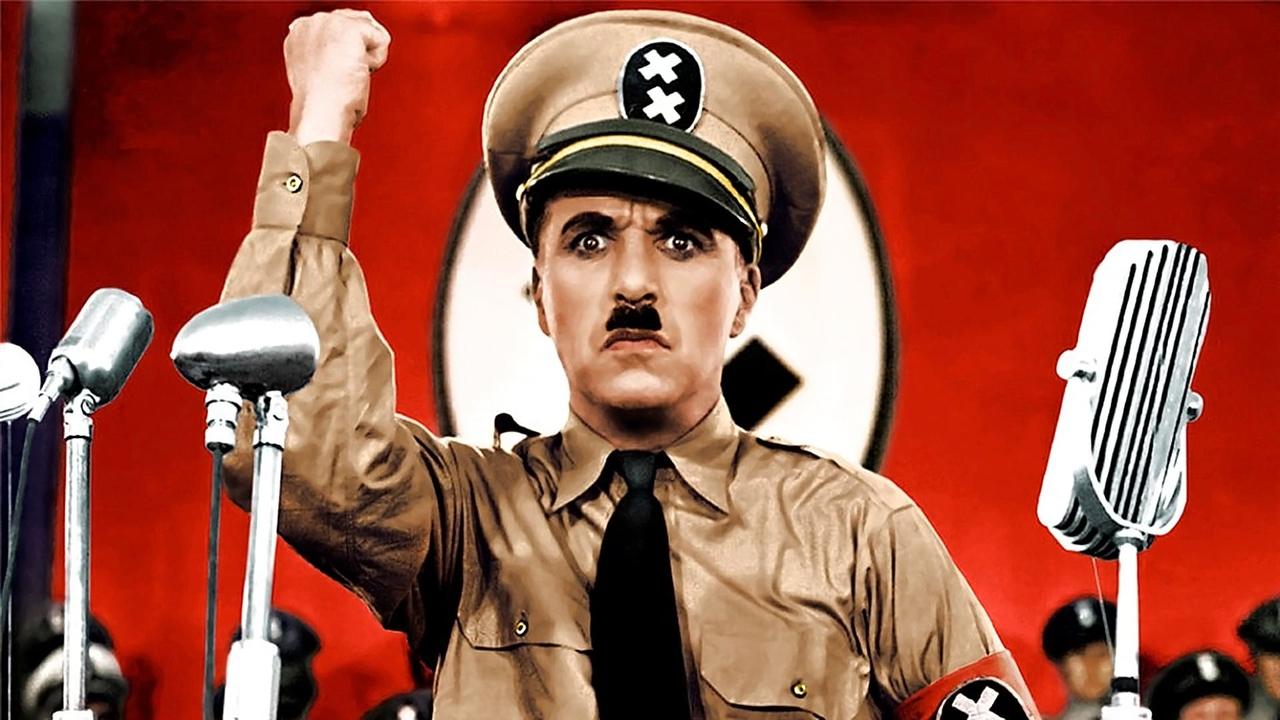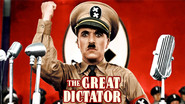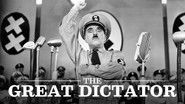alessacarri
This films is like no other that I've seen about World War, even though is not realistic as the other films tried to be that's is not a big deal, the BIG deal we can see in the film is how in 1940 Americans didn't know how dangerous Hitler was, they obviously saw him as crazy man but they were ignorant of the extent of Hitler's Atrocities.
It's fascinating to see how in the final scene of the film, Charles Chaplin realizes that war was coming and Hitler was no joke, so he decides to write the final speech where he tries really hard to get a peace message to the world, one message that nazis and Germans could ear too, he almost begs for humanity to see the world, one world that was rotting.
It's mind blowing how the speech can inspire even now in 2018, Charles Chaplin would be immortal for that.
ryan_cchew
Would you think that creating a satirical film that mocked Adolf Hitler at the time of World War II when the USA and Germany were still at peace was a good idea? In fact, this movie was banned in some countries. Even England did not allow it to be played. In the final scene of The Great Dictator, directed and starred by Charlie Chaplin, he gives an inspirational speech as Hitler and ironically, warns people to not yield to greedy men, to fight for what's right and to learn to love and appreciate everyone. But, the meaning behind what Charlie Chaplin says, the way he presents this speech and how he wrote it is very unique and powerful that makes the viewer want to hear what he is saying. As the film was meant to satirize Hitler and the Nazi regime, Charlie Chaplin presents his speech similarly to the way Hitler speaks publicly. Hitler's tactic was to start off quiet and soft. He then begins to builds momentum and his voice gets increasingly louder and he puts more emphasis on words. He uses hand and facial gestures to get his point across. Despite being a horrible person, he was a very good orator and that allowed him to become a powerful leader. Chaplin imitates this by similarly starting off quiet and slowly, but getting louder as time passes. You can see the effort of Chaplin's facial features being put to use as he is yelling. This makes the viewer more entitled to listen as words are being thrown loudly in front of them along with intense music that builds up. As people are now actively listening, they understand a sense of what he is trying to encapsulate, that being how humanity can better itself. In the speech, he says, "We have developed speed, but we have shut ourselves in. Machinery that gives abundance has left us in want. We think too much and feel too little. More than machinery we need humanity." (The Great Dictator) The way that Chaplin wrote this speech is also strategically written. He uses contrast to emphasize his point that although we as humans have made progress, there are negative consequences of them and these are the things that we need to realize so that we can change now. By saying these things, he has given us a sense of negativity. He then says, "The misery that is now upon us is but the passing of greed – the bitterness of men who fear the way of human progress. The hate of men will pass, and dictators die, and the power they took from the people will return to the people." (The Great Dictator) He shines a light on the positive side of the bitter society at the time and gives hope for the people. Chaplin then inspires and uplifts the audience to not just do nothing when atrocious things are happening. At the end, he says, "Dictators free themselves but they enslave the people! Now let us fight to fulfill that promise! Let us fight to free the world – to do away with national barriers – to do away with greed, with hate and intolerance." (Chaplin) This gives the viewers a final note to not let men like Hitler rise to power, but to unite for a better world. The ending of the speech is that way because he wants the viewers to support his values. He then says, "You people have the power to create happiness! You, the people, have the power to make this life free and beautiful." (Chaplin) Chaplin uses Logos, pathos, and ethos to convey his point. He wants this speech to be easily understood. The reason why this speech is still relevant today and possibly for many years in the future is because it tackles the idea of oppression and how we must do something as the human race to not allow it to happen. It is important that we understand what happened at the time this movie was made as history is bound to repeat itself when people don't learn about it. This speech was made to reinforce the ideas of democracy and to put an end to tyranny and bring society to a better place. Charlie Chaplin mimics Hitler's oral style to grab the attention of the viewer and put them on the same mindset. He writes a powerful speech utilizing a unique way to connect with the reader to warn us about the dangers that are occurring. He wants us, the people, to stand up against people like Hitler, who he portrayed.
david-sarkies
This is probably the film that Chaplin is best known for, even though it isn't actually one of the films from the repertoire of silent classics. In a way it is not so much a criticism of Fascism in Europe but rather a criticism of US isolationism. However, it doesn't necessarily seem to be that as Chaplin seems to be making a mockery of the fascist dictators in Europe as opposed to actually confronting his viewers with the reality of the situation, and while in a sense we may, at least at this time, consider Hitler to be something of a joke, the reality of the horrors weren't going to come to the fore until much later.The film beings in World War I, where a Jewish barber is fighting on the Front Lines, and then ends up not only saving a pilot, but after crashing the plane ending up in hospital with amnesia. Twenty years later we have him leave the hospital and return to the ghetto to see that in one sense nothing has changed, but in another sense quite a lot has changed. The thing is that the Jews up to that time have always lived in Ghettos, and have always suffered persecution under the hands to those around them, however things seemed to be getting a lot worse.The Great Dictator cuts between Hynkle, who is played by Chaplin, and the Barber, who is also played by Chaplin. The Hynkle scenes are in a sense a lot of slapstick, in a way that politicians are mocked. It is similar with the barber scenes, yet Chaplin seems to be trying to challenge us with the problems that the Jews were living under at the time, and the nature of extreme racism. However, he also seemed to be trying to open our eyes to the fact that this wasn't just the case in Germany, but everywhere. The thing was that nobody particularly cared about the Jews, which is why Hitler was able to get away with what he did, though we must remember that he did work to cover the holocaust up somewhat.It isn't a silent film though, which sort confronted me at least since Chaplin was one of the masters of the silent era. However, I doubt it would have worked as one. What is interesting though are the speeches. Obviously there is the great speech that is delivered at the end, which is in effect let's stop being mean to each other and start to learn to actually get along. We also have Hynkle's speeches which are basically gibberish. At first I thought he may have been just mocking Hitler, but there is also that essence with the idea that it is not the content that actually matters, but the energy with which it is delivered. In a way Hitler, like many other populist politicians, are able to get people on side simply by telling them what they want to hear. Also, one could even suggest that the content could be drastically changed, but as long as the energy that delivered the original speech is replicated, then people will simply continue to follow along blindly, which is why the barber was able to get away with what he did.
bscrivener-50810
In his very first 'talkie' film. Charlie Chaplin proves as he did with his silent work to be impressive and inspirational in this now classic comedy/drama parodying the events leading up to and during the Second World War. The film opens with a Jewish soldier fighting on a fictionalised version of the Western Front for the nation of Tomania. After a near-fatal plane crash, the barber loses his memory and spends twenty years recovering in a hospital, during the same time his country and people are undergoing a radical revolution in the name of a new dictator named Adenoid Hynkel. Considered taboo and even downright dangerous at the time, The Great Dictator shows Chaplin to be more than just an outstanding actor and comedian, but a remorseful and courageous human being standing up to the real world troubles at the time and using his voice as a weapon. This is not just apparent in the beautiful and unifying speech that Chaplin delivers in the third act, but in his depiction of dictators and corrupt rulers. The film will have you laughing, cheering and even crying by the soul-touching finale, which challenges the very concept of human nature and the slow demise of mankind. While Chaplin may have come to pass, his legacy has well and truly lived on in what some consider his finest work. The only minor flaws are a lack of a real soundtrack that could have boosted the emotion, especially in the more serious scenes and some recurring gags that loose their comedic value by the end. 9/10



 AD
AD








